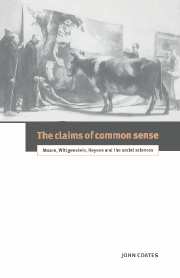Book contents
- Frontmatter
- Contents
- Preface
- Introduction
- 1 A short history of common sense
- 2 Ideal languages and vague concepts: the transition in Cambridge philosophy
- 3 Keynes and Moore's common sense
- 4 Keynes's later views on vagueness and definition
- 5 Samples, generalizations, and ideal types
- 6 The Cambridge philosophical community
- Conclusion: complexity, vagueness, and rhetoric
- Index
4 - Keynes's later views on vagueness and definition
Published online by Cambridge University Press: 19 September 2009
- Frontmatter
- Contents
- Preface
- Introduction
- 1 A short history of common sense
- 2 Ideal languages and vague concepts: the transition in Cambridge philosophy
- 3 Keynes and Moore's common sense
- 4 Keynes's later views on vagueness and definition
- 5 Samples, generalizations, and ideal types
- 6 The Cambridge philosophical community
- Conclusion: complexity, vagueness, and rhetoric
- Index
Summary
VAGUENESS AND MOORE'S PHENOMENOLOGY
There were several problems with Moore's phenomenology. The process of holding a concept before the mind for direct inspection ran into the same difficulties Wittgenstein had encountered when trying to specify logical atoms as the substratum of reality. Both were attempts to specify an indubitable intuition. But no intuition carries its own meaning, independent of an interpretive framework. There is, from this point of view, no difference between the analytics’ recourse to referents, or images, or pictures, or whatever, and Moore's retreat to the phenomenological givens of consciousness. True, Moore's view had the sophistication of not attempting the reduction of consciousness to the atomic level. But it has not escaped Wittgenstein's criticism of all attempts to account for meaning which involve conjuring before the mind an image. Not only can we then question the source of the meaning of this image, as is done in the third man argument, but the whole endeavor implies that meaning is a mental state which accompanies the use of a word, whereas, as Wittgenstein demonstrated, meaning is displayed only in the act of doing things with words. Wittgenstein, in conversation with Norman Malcolm, mockingly described Moore's philosophical method:
Moore would like to stare at a house that is only 20 feet away and say, with a peculiar intonation, “I know that there's a house!” He does this because he wants to produce in himself the feeling of knowing. He wants to exhibit knowing for certain to himself. […]
- Type
- Chapter
- Information
- The Claims of Common SenseMoore, Wittgenstein, Keynes and the Social Sciences, pp. 78 - 98Publisher: Cambridge University PressPrint publication year: 1996



